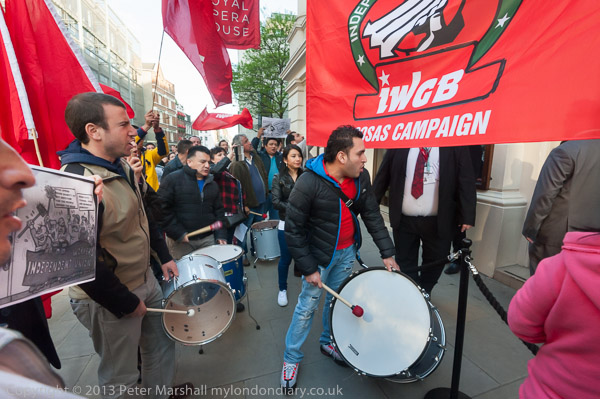
I almost missed the International Workers (IWGB) cleaners protest at the Royal Opera House (ROH) in Covent Garden. I’d been told they would be there at 5pm and either the time had changed or whoever told me had got it wrong, and they were actually planning to start at 5.30pm.
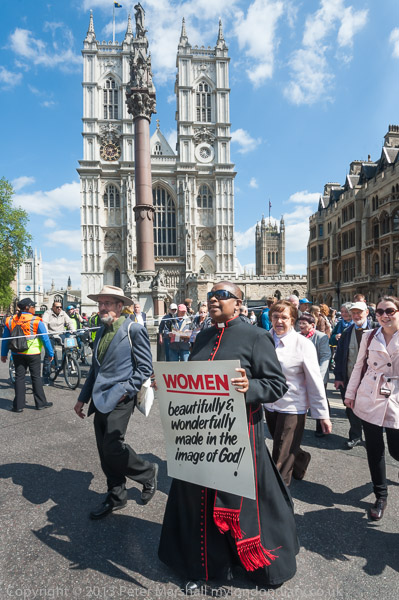
But there was clearly nobody around, or at least no protesters when I arrived a little before 5pm, having been photographing a few other things on the way – a Rastafarian protest calling for the Restoration of the Ethiopian Monarchy (I couldn’t at all understand why they thought that would help in ‘Economic Liberation), then on my way back on the top deck of a double-decker bus I saw the weekly Anti-Fur Picket at Harvey Nichols and decided I had time to cover that on my way to finding a large crowd of Anglican women priests celebrating 20 years of Women Vicars. They were marching from a rally outside Church House, the Anglican HQ where the decision to allow them was taken (rather belatedly as some other Christians had allowed women to take a full part in their work many years earlier – even centuries ago. Then, as so often when walking up Whitehall I’d come across another couple of protests, and photographed one of them, a token Baloch Hunger Strike in sympathy with that about to enter its second week in Karachi.
At 5pm outside the ROH I really thought I’d had enough for the day, and thought about going home; but I’d promised the cleaners I would be there, and sat down in the sun to read a book and wait.
A lot of press photographers spend a lot of time waiting, often outside the homes of people who don’t want to be photographed, or outside courts during celebrity trials, opposite the door of 10 Downing St, and more. I don’t, partly because I’m not desperate for money, mainly because I don’t want to hound the innocent or glorify celebrities. And also because I’m very impatient (and not on payroll.) Anything over ten minutes is really beyond the call of duty for me.
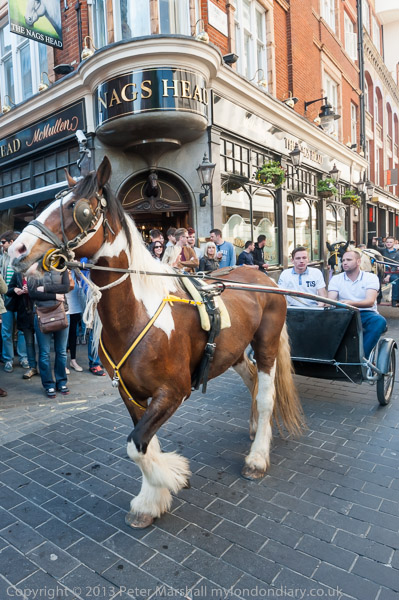
But it was a nice May early evening, and I found a comfortable place in the sun – not then too hot to sit out in and was well into a chapter or two when I was suddenly disturbed by the unmistakable sound of iron-shod hooves and wheels on tarmac and got up to see a whole string of horses and traps approaching at a brisk trot.
I stood up and prepared to take pictures as they came past, but then the leading trap took a fast left turn down Floral St by the side of the Royal Opera House, and I had to run across and down the street to photograph them.
On Floral Street they soon slowed down as the leaders stopped to decide which way to go, before slowly turning to their right and parking up, appropriately by the Nags Head pub. Soon after I’d finished taking a few pictures of them – they included at least one cart rather like those my grandfather had a business making – and made my way back to the front of the ROH, a couple of the cleaners came round looking for people, and I found they were meeting up around the corner at 5.30pm.
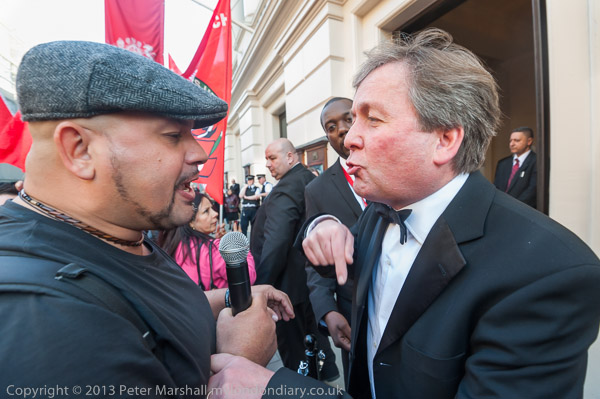
A man in a funny suit gets angry – and the security guard steps in as he grabs IWGB leader Alberto Durango, who refuses to be provoked.
You can see more about their protest and read about why they were at the ROH in IWGB Cleaners at Royal Opera on My London Diary.
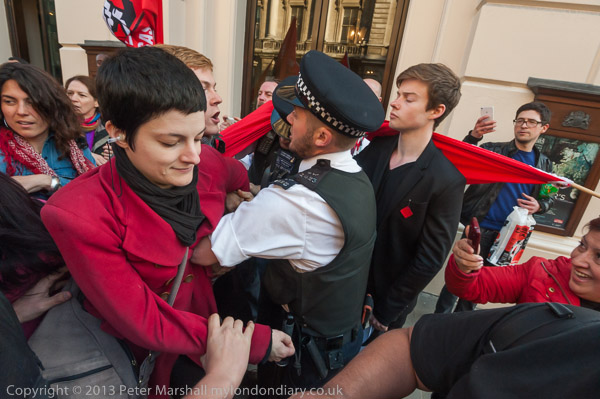
As often seems to be the case at the moment the police, when they arrived some time after the protest had started, seemed to be unsure whether they were present to defend the right to protest or to defend the interests of the wealthy – in this case the ROH and its clients. And at one point when a couple more vans had arrived, they simply seemed to lose the plot completely. It was just lucky those water cannons haven’t arrived yet.
I’m not an opera fan, though I often listen to bits of it as my wife is something of a singer, though her choir sings choral works rather than opera, and often listens to Radio 3 as well as going to some of the Proms and other classical concerts. My favourite singer is BillIe Holiday, who only puts in very rare appearances on Radio 3, though it does have the occasional jazz programme. I favour public subsidies for the arts but object to the fact so much of it goes to opera and in particular the huge £26m for the ROH*. More generally I think it’s time to give a finger to the star system and pay the ‘stars’ less. I think the BBC should take a lead too with truly drastic cuts in what they pay often rather dubious ‘talent’ and management. But if the odd fat lady or gentleman decides not to sing in London, it’s no great loss, and many of the ROH audience will fly abroad to see them in any case.
I’d certainly hope that any future Labour government would make it a requirement for any organisation that receives Arts Council funding in England (and any remaining parts of the UK still under Westminster control) to pay all employees (direct and indirect like the cleaners) a living wage and have decent conditions of employment.
* Disgruntled northerners may like to know that Opera North gets another £9.6m and these two organisations account for around 11% of the budget. The total grant of grants to 699 organisations is £339m, an average for each of £485,000.
______________________________________________________
My London Diary : Buildings of London : River Lea/Lee Valley : London’s Industrial Heritage
All photographs on this and my other sites, unless otherwise stated, are taken by and copyright of Peter Marshall, and are available for reproduction or can be bought as prints.
To order prints or reproduce images
________________________________________________________